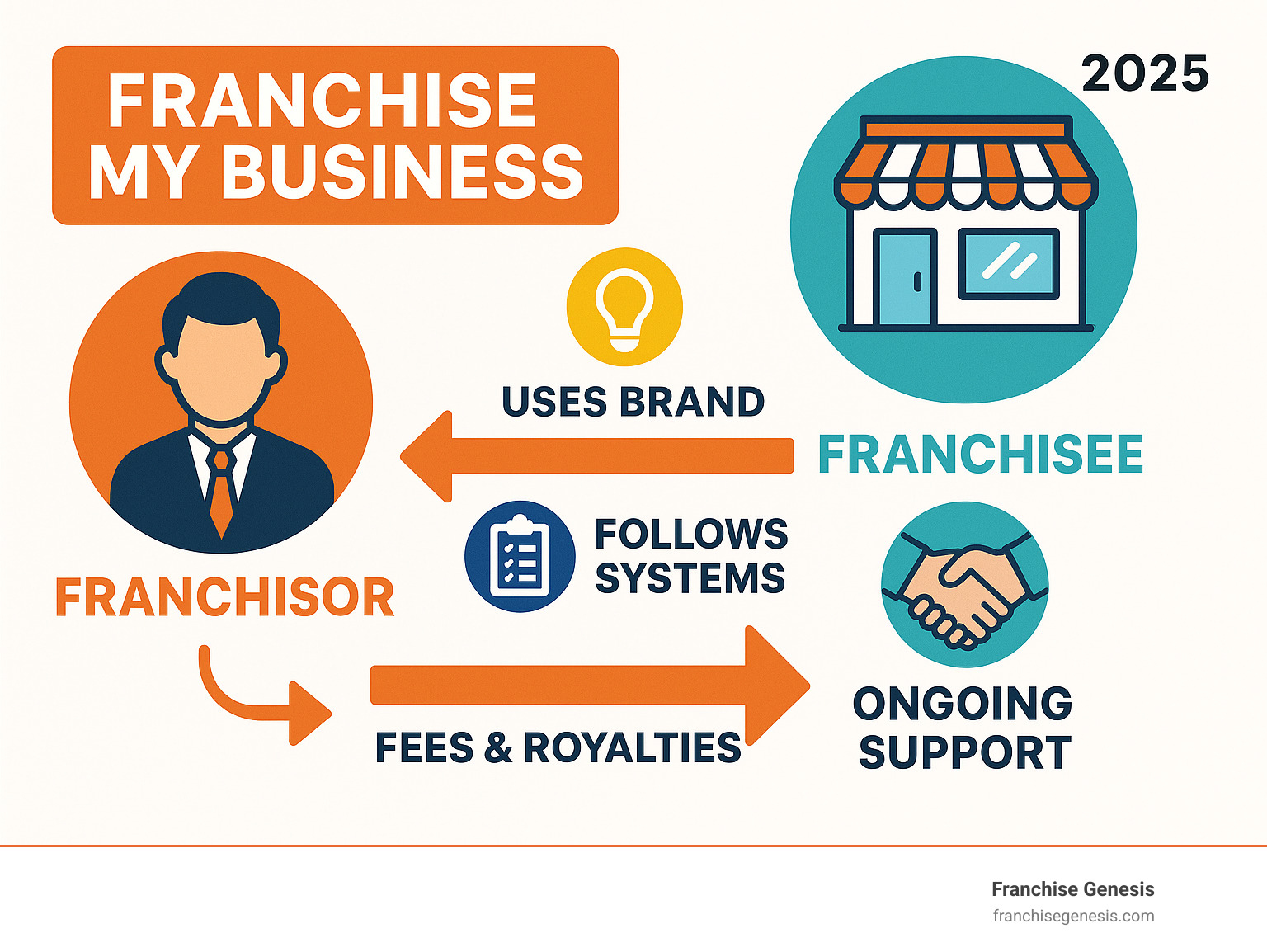Why Franchising Your Business Could Be Your Best Growth Strategy
Franchise My Business is a proven way to scale your successful business faster and with less capital than traditional expansion methods. Here’s what you need to know:
Key Steps to Franchise Your Business:
- Assess your business’s franchisability – proven profitability, replicable systems, strong brand
- Assemble your franchise team – experienced franchise lawyer, accountant, consultant
- Create legal documents – Franchise Disclosure Document (FDD), franchise agreement
- Develop operations manual – detailed procedures and standards for franchisees
- Launch franchise sales – attract, screen, and select qualified franchisees
- Provide ongoing support – training, marketing, operational guidance
The franchise industry generates over $936 billion annually in the United States, with franchised businesses accounting for approximately 50% of all retail sales. When you franchise your business, you’re joining a proven model where franchisees invest their own capital to replicate your concept while paying you initial fees and ongoing royalties.
But franchising isn’t right for every business. Success requires a profitable, scalable model with systems that can be taught to others. You’ll also need to shift from running day-to-day operations to supporting and coaching franchisees across multiple locations.
The typical franchise development process takes 90 to 120 days and costs between $18,500 to $84,500, depending on the complexity of your business and the level of support you choose. This investment covers legal documentation, operations manual development, trademark protection, and initial marketing materials.
I’m Monique Pelle-Kunkle, Vice President of Operations at Franchise Genesis, where I’ve helped hundreds of business owners successfully Franchise My Business across industries from healthcare to mobile services. My experience includes scaling an ABA therapy franchise to over 100 locations in its first year, demonstrating the explosive growth potential when franchising is done right.

Basic Franchise My Business glossary:
What is Franchising and Is It Right for You?
At its core, franchising is a powerful growth strategy where you, as a successful business owner (the franchisor), grant other entrepreneurs (the franchisees) the right to operate a business using your established brand, systems, and trademarks. Think of it as creating a blueprint of your success that others can follow in new markets.
When you Franchise My Business, you’re essentially licensing your proven business model to motivated entrepreneurs who invest their own capital to replicate what you’ve built. It’s like having business partners across multiple locations, but with a structured framework that protects your brand while allowing for controlled expansion.
The beauty of franchising lies in its scalability. Instead of opening every new location yourself – which requires significant capital and your direct management – you empower others to do it for you. The Canadian Franchise Association represents over 700 corporate members with 40,000 franchise owners, showing just how widespread and successful this model has become.
Here’s something encouraging: almost any successful business can be franchised if you structure it properly. The key isn’t your industry – it’s whether your systems and processes can be taught and replicated by someone else. Whether you run a service business, retail operation, or specialized trade company, franchising could be your path to rapid growth.
But let’s be honest – franchising isn’t a magic solution for every business owner. It requires a fundamental shift in how you think about your role. Instead of running day-to-day operations, you become a coach, supporter, and brand guardian for multiple franchisees.
| Advantages of Franchising Your Business | Potential Challenges |
|---|---|
| Rapid expansion with franchisee capital | Reduced control over daily operations |
| Motivated owners running each location | Ongoing support obligations to franchisees |
| Increased brand presence across markets | Legal compliance requirements |
| Reduced operational risk through shared investment | Reputational risk if franchisees underperform |
| Royalty streams providing ongoing income | Franchisee disputes requiring resolution |
The decision to franchise comes down to your growth goals and management style. If you’re excited about building systems, supporting other entrepreneurs, and seeing your brand expand beyond what you could achieve alone, franchising might be perfect for you.
Understanding these trade-offs early helps you make an informed decision about whether to pursue this growth strategy. For more detailed insights into the franchising landscape, explore our franchising insights and find why you should franchise your successful business.
Key Benefits of Franchising
The most compelling reason to Franchise My Business is the rapid expansion potential. While opening company-owned locations might take years of saving and planning, franchising allows you to grow as quickly as you can find qualified franchisees. Each new franchisee brings their own capital investment, meaning you’re not funding every expansion yourself.
Motivated owners make all the difference. Unlike hired managers, franchisees have skin in the game – they’ve invested their own money and their success depends on the location’s performance. This creates a level of dedication and attention to detail that’s hard to replicate with employee-run locations.
Your brand presence multiplies exponentially. Instead of having one or two locations, you could have dozens across different markets, creating name recognition and customer loyalty on a much larger scale. This increased visibility often leads to better vendor negotiations and marketing opportunities.
The reduced operational risk is significant too. When franchisees invest their capital alongside yours, you’re sharing both the financial risk and the day-to-day management responsibilities. Plus, those royalty streams provide ongoing income that grows with your network, creating financial stability beyond just initial franchise fees.
Potential Risks and Challenges
The biggest adjustment most business owners face is reduced control over daily operations. You can set standards and provide training, but ultimately, franchisees run their locations their way within your framework. This can be challenging if you’re used to controlling every detail of your business.
Ongoing support obligations are substantial and ongoing. Franchisees will look to you for guidance on everything from operational issues to marketing questions. You’re not just selling them a business model – you’re committing to support them throughout their journey as franchise owners.
Legal compliance adds complexity you may not have faced before. The franchise industry is heavily regulated, with specific disclosure requirements and relationship rules that vary by state. Staying compliant requires ongoing attention and often legal guidance.
Reputational risk becomes amplified across your network. If one franchisee provides poor customer service or cuts corners, it reflects on your entire brand. Similarly, franchisee disputes can arise over territory rights, marketing decisions, or operational standards, requiring your time and attention to resolve.
These challenges aren’t meant to discourage you – they’re simply realities that successful franchisors learn to steer. Our franchising insights can help you understand how to address these challenges proactively as you build your franchise system.
What is Franchising and Is It Right for You?
Imagine taking your successful business and giving other motivated entrepreneurs the blueprint to recreate that same success in their own markets. That’s essentially what franchising is – a business model where you, as the franchisor, license your brand, systems, and proven methods to franchisees who then operate their own locations under your established framework.
When you Franchise My Business, you’re not just selling a product or service – you’re replicating an entire business system. Your franchisees get access to your brand name, your operational procedures, your marketing strategies, and most importantly, your recipe for success. In return, they typically pay you an initial franchise fee and ongoing royalties.
The beauty of this model lies in its win-win nature. Your franchisees are investing their own capital and sweat equity into growing your brand, while you get to expand rapidly without the massive financial burden of opening every new location yourself. The Canadian Franchise Association represents over 700 corporate members with 40,000 franchise owners – a testament to how well this model works when executed properly.
Here’s something that might surprise you: almost any successful business can be franchised if it’s structured correctly. It’s not about what industry you’re in – it’s about whether your business systems can be taught and replicated by someone else. The key is having proven processes that work consistently, regardless of who’s running them.
To help you determine if franchising aligns with your goals, let’s examine the key advantages and challenges:
| Advantages of Franchising Your Business | Potential Risks and Challenges |
|---|---|
| Rapid expansion without massive capital investment | Reduced control over day-to-day operations |
| Franchisee capital funds growth instead of your money | Ongoing support obligations to franchisees |
| Motivated owners (not employees) running locations | Legal compliance requirements and regulations |
| Increased brand presence across multiple markets | Reputational risk from underperforming franchisees |
| Reduced operational risk through shared responsibility | Franchisee disputes and relationship management |
| Royalty streams providing ongoing passive income | Complex quality control across multiple locations |
Understanding these trade-offs is crucial before you decide to franchise your business. The most successful franchisors are those who accept the shift from being hands-on operators to becoming coaches and supporters of their franchisee network.
Key Benefits of Franchising
The most compelling reason business owners choose to Franchise My Business is the speed of expansion. Instead of opening one location at a time with your own capital, you can potentially have dozens of motivated franchise owners opening locations simultaneously across different markets.
Franchisee capital becomes your growth engine. Each new franchisee invests their own money – often $100,000 to $500,000 or more – to launch their location. This means you can expand your brand’s footprint without depleting your own resources or taking on massive debt.
Perhaps even more valuable than their money is their motivation. Franchisees are owners, not employees. They have skin in the game and a personal stake in making their location successful. This owner mentality typically translates into better customer service, more attention to detail, and stronger local community connections than you might see with hired managers.
The increased brand presence creates a compound effect. As your franchise network grows, your brand becomes more recognizable, your marketing becomes more cost-effective per location, and you gain negotiating power with suppliers. Royalty streams from successful franchisees provide ongoing income that’s less dependent on the daily operations of any single location.
Potential Risks and Challenges
The biggest adjustment most business owners face when they Franchise My Business is the reduced control over daily operations. You’re no longer making every decision or overseeing every customer interaction. This can be particularly challenging for hands-on entrepreneurs who are used to controlling every aspect of their business.
Ongoing support obligations are both a responsibility and a significant time investment. Your franchisees will look to you for guidance on everything from operational issues to marketing strategies. You become a coach, consultant, and problem-solver for multiple business owners simultaneously.
Legal compliance in franchising is complex and varies by state. The Federal Trade Commission’s regulations, known as the Franchise Rule, require specific disclosures and documentation, and failing to comply can result in serious legal consequences. This is why working with experienced franchise professionals is essential.
Reputational risk is perhaps the most serious challenge. When a franchisee provides poor service or fails to maintain standards, it reflects on your entire brand. One underperforming location can damage the reputation you’ve spent years building. This makes franchisee selection and ongoing quality control absolutely critical.
For deeper insights into navigating these challenges successfully, explore our franchising insights to learn from the experiences of other successful franchisors.
